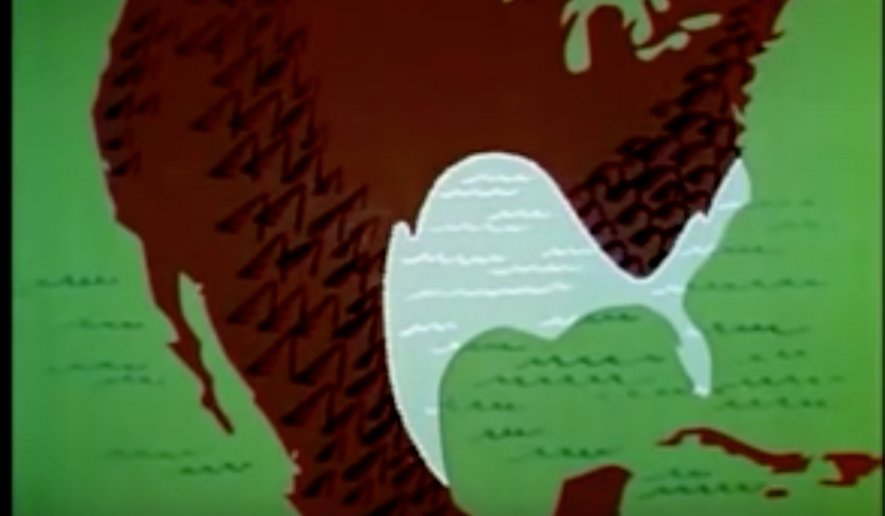ExxonMobil received a helping hand Wednesday in its battle to debunk the climate-change movement’s #ExxonKnew narrative from an unexpected source: the New York Times.
An exhaustive investigative article in the New York Times Magazine said that Exxon was one of multiple entities that “knew” decades ago about the potential perils of climate change, the others being the federal government, the auto industry, trade groups for the electrical grid and the television-watching public.
“Everybody knew,” said the article by Nathaniel Rich, who spent 18 months researching and writing the piece that took up the entire magazine.
He cited an episode of “The Bell Science Hour,” a popular educational film series, that warned on prime-time television in 1958 that “man may be unwittingly changing the world’s climate” through the release of carbon-dioxide emissions into the atmosphere.
The film’s host, Dr. Research, warned that “a few degrees rise” in the planet’s temperature would melt the polar ice caps, fill the Mississippi Valley, and cover Miami in 150 feet of tropical ocean. Produced by the legendary director Frank Capra (“Mr. Smith Goes to Washington,” “It’s a Wonderful Life”), the episode was shown in classrooms for decades.
“Everyone knew—and we all still know,” said the article, entitled, “Losing Earth: The Decade We Almost Stopped Climate Change.”
Thirty years ago, we almost saved the planet. This is the story of how we failed. https://t.co/EglEQFwHPu pic.twitter.com/WBtopm5ppt
— NYT Magazine (@NYTmag) August 1, 2018
The ambitious two-part report, which received support from the Pulitzer Center, said the lack of action on climate change came even though the industry and Republicans were concerned early on about the issue.
“The coordinated effort to bewilder the public did not begin in earnest until the end of 1989,” said the article. “During the preceding decade, some of the largest oil companies, including Exxon and Shell, made good-faith efforts to understand the scope of the crisis and grapple with possible solutions.”
That debunking of the #ExxonKnew campaign certainly wasn’t what climate-change advocates nor industry groups were expecting to read in the much-anticipated report, and they reacted accordingly.
“It may not have been the intent of New York Times Magazine to throw cold water on a fringe environmental activist campaign, but the damage has clearly been done,” said Spencer Walrath of Energy in Depth, an industry-backed website.
“If all of humanity was informed of the dangers of climate change in the 1970s and agreed that something needed to be done, how can activists lay the blame for global inaction at the feet of the industry and political partisanship?” he asked.
Climate activists thought they had momentum. Then @NYTmag undermined their core campaign. https://t.co/bZsRGiA60M pic.twitter.com/cBtEWivsbe
— Energy In Depth (@EnergyInDepth) August 1, 2018
Meanwhile, environmentalists accused the newspaper of focusing too heavily on the past while “whitewashing the role of Big Oil and GOP,” as ThinkProgress put it.
The progressive outlet quoted several professors who challenged the investigative report’s thesis, including Drexel University sociologist Bob Brulle, who called the article “a highly selective historical account that omits key facts that run counter to its overall narrative.”
“Maybe news to NYT, but a movement millions strong knows who’s really to blame—fossil fuel billionaires,” said 350.org on Twitter. “And we sure as hell haven’t lost yet.”
This. @NYTmag’s pessimistic story about the fight to stop climate change in the 1980s is wrong in the 2 most important ways:
— 350 dot org (@350) August 1, 2018
- Big polluters & their decades of denial—not “human nature”—are to blame.
- We still have time to act. We’re not #LosingEarth yet. #thread: https://t.co/1MBqAhK17a
Said 350’s Jamie Henn: “The NYT’s #Losing Earth piece argues that ’everyone knew’ along with Exxon…yeah, but ’everyone didn’t spend millions on a public deception campaign and lie to shareholders.”
The NYT’s #LosingEarth piece argues that “everyone knew” along with Exxon…yeah, but “everyone” didn’t spend millions on a public deception campaign and lie to shareholders. Key difference. pic.twitter.com/LjR6OZUco8
— Jamie Henn (@Agent350) August 1, 2018
The allegations behind the #ExxonKnew campaign were rooted in a September 2015 report, “Exxon: The Road Not Taken,” by InsideClimate News, a finalist for the 2016 Pulitzer Prize in public service.
The ripple effect was immediate. The report was credited with inspiring the multi-state effort launched in March 2016 to pursue Exxon and other companies led by then-New York Attorney General Eric Schneiderman.
The “Exxon knew” allegations have also been cited in the lawsuits filed by Rhode Island and a dozen localities, including New York City and San Francisco, seeking billions to gird their communities against predicted sea-level rise and other climate change.
Mr. Rich told PBS NewsHour that, “By the mid-50s, you had top government scientists speaking about the issue. You had major articles in Life Magazine and Time. So it wasn’t just industry that was following it.”
He added that President Lyndon B. Johnson “sent a special message to Congress in 1965 that discussed the problem.”
• Valerie Richardson can be reached at vrichardson@washingtontimes.com.




Please read our comment policy before commenting.